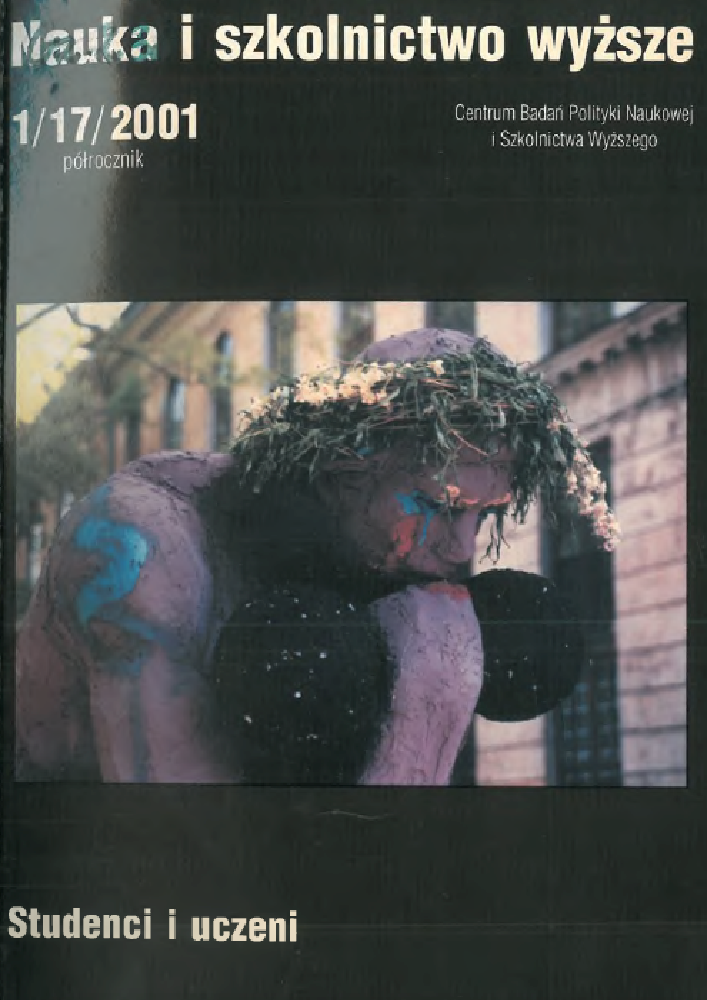Abstract
The author discusses selected aspects of the setting in which Polish higher educational establishments have been functioning since 1990 and compares the dynamics of academic careers over several generations, making allowance for the two sexes and the disciplines in which these careers are pursued. Her main concern and hypothesis focus on the relations between the conditions of scientific research and education offered by the higher education system in Poland in the nineties and the dynamics of scientific careers. Reduced financing of academic teaching and research and the deteriorating material situation of people employed in this sector have led to the slowing down of scientific careers in terms of the time needed to obtain consecutive degrees. The next hypothesis which the author puts to test is concerned with the changing structure of research staffs. Deteriorating conditions on two dimensions, the possibility of conducting scientific research, and the possibility of achieving satisfactory material rewards from work at research institutes and higher education institutions, have changed the structure of employment. For these reasons and also because of the increasing proportion of female students, observed earlier, the number of women on university faculties is continuing it grow, albeit slowly. The author bases her discussion on analysis of statistical data on higher education institutions throughout the country and a case study of one of the biggest university in Poland.
References
Białecki I. 1997 Nierówności w dostępie do kształcenia w Polsce powojennej, w: R. Siemieńska (red.): Wokół problemów zawodowego równouprawnienia kobiet i mężczyzn, Fundacja Wspierania Prawa Europejskiego, Warszawa.
Brooks A. 1997 Academic Women, Society for Research into Higher Education, Open University Press, Bristol.
Chojnicki Z., Czyż T. 1994 Polish Science in a Regional Approach, w: A. Kukliński (ed.): Science, Technology, Economy, Uniwersytet Warszawski, Warszawa.
Dickman H. 1993 The Imperiled Academy, Transaction Publishers, New Brunswick - London.
Edukacja... 1991 Edukacja 1990-1991, GUS, Warszawa.
Eggins H. 1997 Women as Leaders and Managers in Higher Education, Society for Research into Higher Education, Open University Press, Bristol.
Hryniewicz J., Jałowiecki B. 1994 Rynek pracy intelektualnej w Polsce, Uniwersytet Warszawski, Warszawa.
Jałowiecki B., Hryniewicz J., Mync A. 1994 The Brain Drain from Science and Universities in Poland, 1992-1993, Uniwersytet Warszawski, Warszawa.
Janion M.1995 Za waszą i naszą wolność, „Gazeta Wyborcza”, 3-4 lutego.
Jasińska A., Siemieńska R. 1983 The Socialist Personality. A Case Study of Poland, „International Journal of Sociology”, nr 13.
„Mały Rocznik Statystyczny” 1939, GUS, Warszawa.
Miluska J. 1995 Tożsamość kobiet i mężczyzn w cyklu życia, Wydawnictwo Naukowe Uniwersytetu Adama Mickiewicza, Poznań.
Nisbet R. 1980 The Future of University, w: S. M. Lipset (ed.): The Third Century. America as a Post-Industrial Society, The University of Chicago Press, Chicago - London.
Raport... 2000 Raport o stanie nauki i techniki w Polsce 1999, GUS, Warszawa.
„Rocznik Statystyczny” 1986 ,1998 ,1999, 2000, GUS, Warszawa.
„Rocznik Statystyczny Rzeczypospolitej Polskiej”, GUS, Warszawa.
Scott R 1995 The Meanings of Mass Higher Education, The Society for Research into Higher Education, Open University Press, Bristol.
Siemieńska R. 1986 Women and Social Movements in Poland, „Women and Politics”, nr 6/4.
Siemieńska R. 1989 Poland, w: G. P Kelly (ed.): International Handbook of Women’s Education, Greenwood Press, New York - London.
Siemieńska R. 1990 Pleć, zawód, polityka. Udział kobiet w życiu publicznym w Polsce, Instytut Socjologii Uniwersytetu Warszawskiego, Warszawa.
Siemieńska R. 1992 Academic Careers in Poland: Does Gender Make a Difference?, „Higher Education in Europe”, nr 23/2.
Siemieńska R. 1998 Dimensions of Gender Inequality, referat na konferencję UNESCO nt. Women in Science, Quality and Equality - Conditions for Sustainable Human Development, Bied, Słowenia, 5-7 listopada 1998.
Siemieńska R. 2000a Academe as a Space for Women and a Place for the Study and Promotion of Gender Equity in Poland, w: L. Grunberg (ed.): Good Practice in Promoting Gender Equality in Higher Education in Eastern and Central Europe and the Former Soviet Countries, UNESCO, Bucharest.
Siemieńska R. 2000b Women in Academe in Poland: Winners Among Losers, "Higher Education in Europe”, nr 25/2.
Siemieńska R. (red.) 1997 Portrety kobiet i mężczyzn w środkach masowego przekazu i podręcznikach szkolnych, Fundacja Friedricha Eberta, Instytut Studiów Społecznych Uniwersytetu Warszawskiego, Warszawa.
Słomczyński K., Wesołowski W. (red.) 1973 Struktura i ruchliwość społeczna, Ossolineum, Warszawa.
Staruchowicz W. 2001 Lista płac internautów, „Rzeczpospolita”, 11 kwietnia.
Szkolnictwo wyższe... 1997 Szkolnictwo wyższe w roku akademickim 1996-1997, GUS, Warszawa.
Szkoty wyższe... 2000 Szkoły wyższe i ich finanse w 1999 roku, GUS, Warszawa.
Wnuk-Lipińska E. 1996 Innowacyjność a konserwatyzm. Uczelnie polskie w procesie przemian społecznych, Centrum Badań Polityki Naukowej i Szkolnictwa Wyższego Uniwersytetu Warszawskiego, Warszawa.
